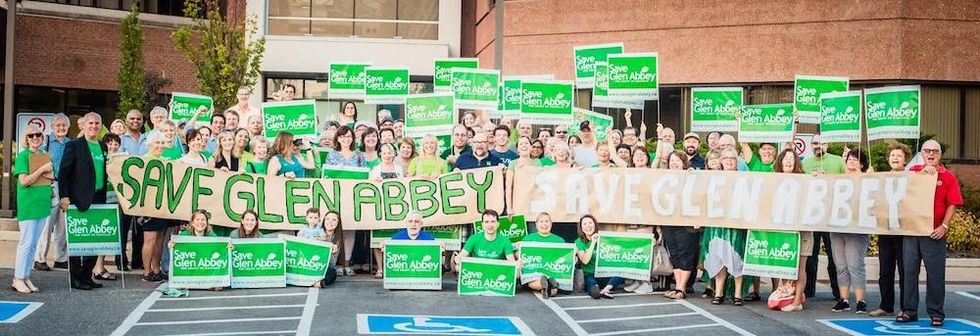Oakville officials are calling on the province to finally crush plans for a housing development at the pristine and renowned Glen Abbey Golf Club, potentially turning to a Minister’s Zoning Order (MZO).
An powerful and controversial tool, an MZO allows the provincial government to forgo the planning process and make immediate decisions with respect to future developments, which can’t be appealed.
In a questionable move that’s been met with no shortage of vocal opponents from the Oakville area and beyond, ClubLink -- the owner of the 80-hectare plot of land that houses the golf course -- wants to replace the breezy links with more than 3000 homes. The proposed plan also includes parkland and office buildings.
Potentially doing away with the famous golf course is a head-scratcher for many people from Oakville and, frankly, across the country.
READ: Demolition of Toronto’s Foundry Buildings Bring MZOs Back into Spotlight
The celebrated course was designed by American golf icon Jack Nicklaus in 1977 and has been regarded as one of Canada's top golf courses ever since. It’s home to Golf Canada and the Canadian Golf Hall of Fame and has hosted 30 Canadian Open Championships.
But it’s not just the deep-pocketed golfers who are upset about the whole issue.
Oakville city officials and a handful of passionate local organizations have fought back against the plan for years. The golf course, they say, should remain in-tact, and a development is out of line with the town's Livable Oakville Plan. Not only should its history be celebrated and protected, so should its environmental characteristics, they've relentlessly argued.

“What we want the government to do is act to save it; we don’t care what they do to save it,” says Bill McKinlay, spokesperson for local group Save Glen Abbey.
On its website, Save Glen Abbey lists 30 reasons why the development shouldn’t go ahead, ranging from zoning and target growth concerns, to the need to protect Halton Region's largest watershed and prevent the removal of some 1200 mature and semi-mature trees.
“It all comes down to planning and who has the right to plan,” says McKinlay. "The town has a very robust planning process and Glen Abbey lands are not slated for development. They are recreational greenspace in the official plan. That plan received public input and it includes the required protentional growth up to 2040.”
Back in 2017, Oakville city council unanimously voted to designate Glen Abbey Golf Club a heritage site and to reject ClubLink’s plan for the land. After a years-long battle between ClubLink and Oakville City Council since, an Ontario Land Tribunal that will determine the golf course’s fate is set to begin at the end of the summer. But the use of an MZO could stop this process before it starts.
Earlier this week, local MPP Stephen Crawford sent a letter to Oakville Mayor Rob Burton asking him to formally request the order in order to save the land quickly.
“All MZOs are at the request of the local community,” said Crawford. “I sent a letter to Mayor Burton and town council suggesting they put forth a resolution that supports an MZO that they can then forward to the government. In my view, it’s one of the best options in order to preserve Glen Abbey.”
Dated June 21, the letter reads, in part:
“As you know, the Minister of Municipal Affairs and Housing has been clear in his promise to only consider issuing Ministerial Zoning Orders (MZO) on non-provincially owned land when a local municipality formally files a request for such an order...I hope that Your Worship and council members do the right thing by working quickly to pass such a resolution."
Crawford says the move was inspired by the recent uses of the MZO
“I am now seeing the opportunity to use MZOs more often with our government," says Crawford. "Last week, in Georgina in the York-Simcoe region, they actually used an MZO to protect green space for the first time. Furthermore, the government has made a commitment to add two-acres of green space for every acre that’s being utilized for green space.”
As for Mayor Burton, he seems to be on board. “I can’t speak for him, but I think he is supportive and will likely do a town council resolution to support an MZO,” said Crawford. “That’s the signal he’s given to the community.”
While MZOs have been used at unprecedented rates in recent years, they’re usually met with pushback from local community groups, who express concerns about new developments impeding precious green space or replacing meaningful heritage buildings.
In this case, we see a reversal: the MZO could be used in attempt to stop development and preserve the land. The proposed move comes after the Halton Regional Council passed an unanimous motion last week to nudge the province as a reminder of its commitment to protect Glen Abbey and urging it to use all the resources and tools available to protect the land.
Now, if an MZO is issued, it will stop plans for the development in its tracks and eliminate the need for the costly and time-consuming tribunal process that's a waste of tax-payers' dollars.
“The community doesn’t want it, the town doesn’t want it, and it’s not in the plans,” says McKinlay. “Let’s respect the town’s ability to plan. I can’t tear down my house and put up a gas station.”
***STOREYS reached out to ClubLink for comment but hadn't heard back at time of publishing.





















